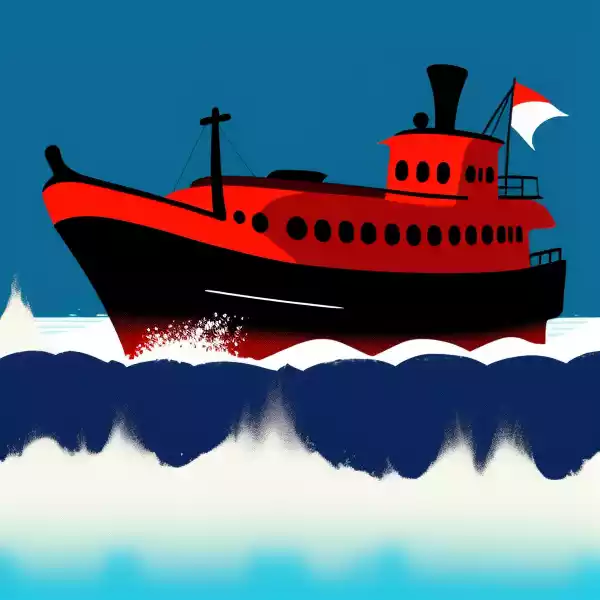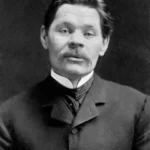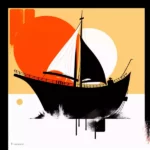 | |
On A River Steamer | |
| Author | Maxim Gorky |
|---|---|
| Published |
1897
|
| Language | English |
| Original Language | Russian |
| Nationality | Russian |
| Genre | Russian Literature, Socialist Realism |
1897 Short Story
On A River Steamer
On A River Steamer is an English Russian Literature, Socialist Realism short story by Russian writer Maxim Gorky. It was first published in 1897.
On A River Steamer
by Maxim Gorky
The water of the river was smooth, and dull silver of tint. Also, so barely perceptible was the current that it seemed to be almost stagnant under the mist of the noontide heat, and only by the changes in the aspect of the banks could one realise how quietly and evenly the river was carrying on its surface the old yellow-hulled steamer with the white-rimmed funnel, and also the clumsy barge which was being towed in her wake.
Dreamily did the floats of the paddle-wheels slap the water. Under the planks of the deck the engines toiled without ceasing. Steam hissed and panted. At intervals the engine-room bell jarred upon the car. At intervals, also, the tiller-chains slid to and fro with a dull, rattling sound. Yet, owing to the somnolent stillness settled upon the river, these sounds escaped, failed to catch one’s attention.
Through the dryness of the summer the water was low. Periodically, in the steamer’s bow, a deck hand like a king, a man with a lean,, yellow, black-avised face and a pair of languishing eyes, threw overboard a polished log as in tones of melting melancholy he chanted:
“Se-em, se-em, shest!”
[“Seven, seven, six!”(the depth of water, reckoned in sazheni or fathoms)]
It was as though he were wailing:
“Seyem, seyem, a yest-NISHEVO”
[Let us eat, let us eat, but to eat there is–nothing]
Meanwhile, the steamer kept turning her stearlet-like [The stearlet is a fish of the salmon species] prow deliberately and alternately towards either bank as the barge yawed behind her, and the grey hawser kept tautening and quivering, and sending out showers of gold and silver sparkles. Ever and anon, too, the captain on the bridge kept shouting, hoarsely through a speaking-trumpet:
“About, there!”
Under the stem of the barge a wave ran which, divided into a pair of white wings, serpentined away towards either bank.
In the meadowed distance peat seemed to be being burnt, and over the black forest there had gathered an opalescent cloud of smoke which also suffused the neighbouring marshes.
To the right, the bank of the river towered up into lofty, precipitous, clayey slopes intersected with ravines wherein aspens and birches found shelter.
Everything ashore had about it a restful, sultry, deserted look. Even in the dull blue, torrid sky there was nought save a white-hot sun.
In endless vista were meadows studded with trees–trees sleeping in lonely isolation, and, in places, surmounted with either the cross of a rural church which looked like a day star or the sails of a windmill; while further back from the banks lay the tissue cloths of ripening crops, with, here and there, a human habitation.
Throughout, the scene was indistinct. Everything in it was calm, touchingly simple, intimate, intelligible, grateful to the soul. So much so that as one contemplated the slowly-varying vistas presented by the loftier bank, the immutable stretches of meadowland, and the green, timbered dance-rings where the forest approached the river, to gaze at itself in the watery mirror, and recede again into the peaceful distance; as one gazed at all this one could not but reflect that nowhere else could a spot more simply, more kindly, more beautiful be found, than these peaceful shores of the great river.
Yet already a few shrubs by the river’s margin were beginning to display yellow leaves, though the landscape as a whole was smiling the doubtful, meditative smile of a young bride who, about to bear her first child, is feeling at once nervous and delighted at the prospect.
*************************
The hour was past noon, and the third-class passengers, languid with fatigue induced by the heat, were engaged in drinking either tea or beer. Seated mostly on the bulwarks of the steamer, they silently scanned the banks, while the deck quivered, crockery clattered at the buffet, and the deck hand in the bows sighed soporifically:
Six! Six! Six-and-a-half!
From the engine-room a grimy stoker emerged. Rolling along, and scraping his bare feet audibly against the deck, he approached the boatswain’s cabin, where the said boatswain, a fair-haired, fair-bearded man from Kostroma was standing in the doorway. The senior official contracted his rugged eyes quizzically, and inquired:
“Whither in such a hurry?”
“To pick a bone with Mitka.”
“Good!”
With a wave of his black hand the stoker resumed his way, while the boatswain, yawning, fell to casting his eyes about him. On a locker near the companion of the engine-room a small man in a buff pea-jacket, a new cap, and a pair of boots on which there were clots of dried mud, was seated.
Through lack of diversion the boatswain began to feel inclined to hector somebody, so cried sternly to the man in question:
“Hi there, chawbacon!”
The man on the locker turned about–turned nervously, and much as a bullock turns. That is to say, he turned with his whole body.
“Why have you gone and put yourself THERE?” inquired the boatswain. “Though there is a notice to tell you NOT to sit there, it is there that you must go and sit! Can’t you read?”
Rising, the passenger inspected not the notice, but the locker. Then he replied:
“Read? Yes, I CAN read.”
“Then why sit there where you oughtn’t to?”
“I cannot see any notice.”
“Well, it’s hot there anyway, and the smell of oil comes up from the engines. . . . Whence have you come?”
“From Kashira.”
“Long from home?”
“Three weeks, about.”
“Any rain at your place?”
“No. But why?”
“How come your boots are so muddy?”
The passenger lowered his head, extended cautiously first one foot, and then the other, scrutinised them both, and replied:
“You see, they are not my boots.”
With a roar of laughter that caused his brilliant beard to project from his chin, the boatswain retorted:
“I think you must drink a bit.”
The passenger said nothing more, but retreated quietly, and with short strides, to the stem. From the fact that the sleeves of his pea-jacket reached far below his wrists, it was clear that the garment had originated from the shoulders of another man.
As for the boatswain, on noting the circumspection and diffidence with which the passenger walked, he frowned, sucked at his beard, approached a sailor who was engaged in vigorously scrubbing the brass on the door of the captain’s cabin with a naked palm, and said in an undertone:
“Did you happen to notice the gait of that little man there in the light pea-jacket and dirty boots? “
“I did.”
“Then see here. Do keep an eye upon him.”
“But why? Is he a bad lot?”
“Something like it, I think.”
“I will then.”
At a table near the hatchway of the first-class cabin, a fat man in grey was drinking beer. Already he had reached a state of moderate fuddlement, for his eyes were protruding sightlessly and staring unwinkingly at the opposite wall. Meanwhile, a number of flies were swarming in the sticky puddles on the table, or else crawling over his greyish beard and the brick-red skin of his motionless features.
The boatswain winked in his direction, and remarked:
“Half-seas over, HE is.”
“‘Tis his way,” a pockmarked, eyebrow-less sailor responded.
Here the drunken man sneezed: with the result that a cloud of flies were blown over the table. Looking at them, and sighing as his companion had done, the boatswain thoughtfully observed:
“Why, he regularly sneezes flies, eh?”
******************************
The resting-place which I myself had selected was a stack of firewood over the stokehole shoot; and as I lay upon it I could see the hills gradually darkening the water with a mourning veil as calmly they advanced to meet the steamer; while in the meadows, a last lingering glow of the sunset’s radiance was reddening the stems of the birches, and making the newly mended roof of a hut look as though it were cased in red fustian– communicating to everything else in the vicinity a semblance of floating amid fire– and effacing all outline, and causing the scene as a whole to dissolve into streaks of red and orange and blue, save where, on a hill above the hut, a black grove of firs stood thrown into tense, keen, and clear-cut relief.
Under a hill a party of fishermen had lit a wood fire, the flames of which could be seen playing upon, and picking out, the white hull of a boat– the dark figure of a man therein, a fishing net suspended from some stakes, and a woman in a yellow bodice who was sitting beside the fire. Also, amid the golden radiance there could be distinguished a quivering of the leaves on the lower branches of the tree whereunder the woman sat shaded.
All the river was calm, and not a sound occurred to break the stillness ashore, while the air under the awning of the third-class portion of the vessel felt as stifling as during the earlier part of the day. By this time the conversation of the passengers, damped by the shadow of dusk, had merged into a single sound which resembled the humming of bees; and amid it one could not distinguish nor divine who was speaking, nor the subject of discussion, since every word therein seemed disconnected, even though all appeared to be talking amicably, and in order, concerning a common topic. At one moment a suppressed laugh from a young woman would reach the ear; in the cabin, a party who had agreed to sing a song of general acceptation were failing to hit upon one, and disputing the point in low and dispassionate accents; and in each, such sound there was something vespertinal, gently sad, softly prayer-like.
From behind the firewood near me a thick, rasping voice said in deliberate tones:
“At first he was a useful young fellow enough, and clean and spruce; but lately, he has become shabby and dirty, and is going to the dogs.”
Another voice, loud and gruff, replied:
“Aha! Avoid the ladies, or one is bound to go amiss.”
“The saying has it that always a fish makes for deeper water.”
“Besides, he is a fool, and that is worse still. By the way, he is a relative of yours, isn’t he?”
“Yes. He is my brother.”
“Indeed? Then pray forgive me.”
“Certainly; but, to speak plainly, he is a fool.”
At this moment I saw the passenger in the buff pea-jacket approach the sally-port, grasp with his left hand a stanchion, and step on to the grating under which one of the paddle-wheels was churning the water to foam. There he stood looking over the bulwarks with a swinging motion akin to that of a bat when, grappling some object or another with its wings, it hangs suspended in the air. The fact that the man’s cap was drawn tightly over his ears caused the latter to stick out almost to the point of absurdity.
Presently he turned and peered into the gloom under the awning, though, seemingly, he failed to distinguish myself reposing on the firewood. This enabled me to gain a clear view of a face with a sharp nose, some tufts of light-coloured hair on cheeks and chin, and a pair of small, muddy-looking eyes. He stood there as though he were listening to something.
All of a sudden he stepped firmly to the sally-port, swiftly unlashed from the iron top-rail a mop, and threw it overboard. Then he set about unlashing a second article of the same species.
“Hi!” I shouted to him. “What are you doing there?”
With a start the man turned round, clapped a hand to his forehead to discover my whereabouts, and replied softly and rapidly, and with a stammer in his voice:
“How is that your business? Get away with you!”
Upon this I approached him, for I was astonished and amused at his impudence.
“For what you have done the sailors will make you pay right enough,” I remarked.
He tucked up the sleeves of his pea-jacket as though he were preparing for a fight. Then, stamping his foot upon the slippery grating, he muttered:
“I perceived the mop to have come untied, and to be in danger of falling into the water through the vibration. Upon that I tried to secure it, and failed, for it slipped from my hands as I was doing so.”
“But,” I remarked in amazement, “my belief is that you WILLFULLY untied the mop, to throw it overboard!”
“Come, come!” he retorted. “Why should I have done that? What an extraordinary thing it would have been to do! How could it have been possible?”
Here he dodged me with a dexterous movement, and, rearranging his sleeves, walked away. The length of the pea-jacket made his legs look absurdly short, and caused me to notice that in his gait there was a tendency to shuffle and hesitate.
Returning to my retreat, I stretched myself upon the firewood once more, inhaled its resinous odour, and fell to listening to the slow-moving dialogue of some of the passengers around me.
“Ah, good sir,” a gruff, sarcastic voice began at my side– but instantly a yet gruffer voice intervened with:
“Well?”
“Oh, nothing, except that to ask a question is easy, and to answer it may be difficult.”
“True.”
From the ravines a mist was spreading over the river.
****************************
At length night fell, and as folk relapsed into slumber the babel of tongues became stilled. The car, as it grew used to the boisterous roar of the engines and the measured rhythm of the paddle-wheels, did not at first notice the new sound born of the fact that into the sounds previously made familiar there began to intrude the snores of slumberers, and the padding of soft footsteps, and an excited whisper of:
“I said to him–yes, I said: ‘Yasha, you must not, you shall not, do this.'”
The banks had disappeared from view. Indeed, one continued to be reminded of their existence only by the slow passage of the scattered fires ashore, and the fact that the darkness lay blacker and denser around those fires than elsewhere. Dimly reflected in the river, the stars seemed to be absolutely motionless, whereas the trailing, golden reproductions of the steamer’s lights never ceased to quiver, as though striving to break adrift, and float away into the obscurity. Meanwhile, foam like tissue paper was licking our dark hull, while at our stern, and sometimes overtaking it, there trailed a barge with a couple of lanterns in her prow, and a third on her mast, which at one moment marked the reflections of the stars, and at another became merged with the gleams of firelight on one or the other bank.
On a bench under a lantern near the spot where I was lying a stout woman was asleep. With one hand resting upon a small bundle under her head, she had her bodice torn under the armpit, so that the white flesh and a tuft of hair could be seen protruding. Also, her face was large, dark of brow, and full of jowl to a point that caused the cheeks to roll to her very ears. Lastly, her thick lips were parted in an ungainly, corpselike smile.
From my own position on a level higher than hers, I looked dreamily down upon her, and reflected: “She is a little over forty years of age, and (probably) a good woman. Also, she is travelling to visit either her daughter and son-in-law, or her son and daughter-in-law, and therefore is taking with her some presents. Also, there is in her large heart much of the excellent and maternal.”
Suddenly something near me flashed as though a match had been struck, and, opening my eyes, I perceived the passenger in the curious pea-jacket to be standing near the woman spoken of, and engaged in shielding a lighted match with his sleeve. Presently, he extended his hand and cautiously applied the particle of flame to the tuft of hair under the woman’s armpit. There followed a faint hiss, and a noxious smell of burning hair was wafted to my nostrils.
I leapt up, seized the man by the collar, and shook him soundly.
“What are you at?” I exclaimed.
Turning in my grasp he whispered with a scarcely audible, but exceedingly repulsive, giggle:
“Haven’t I given her a good fright, eh?”
Then he added:
“Now, let me go! Let go, I say!”
“Have you lost your wits?” I retorted with a gasp.
For a moment or two his blinking eyes continued to glance at something over my shoulder. Then they returned to me, while he whispered:
“Pray let me go. The truth is that, unable to sleep, I conceived that I would play this woman a trick. Was there any harm in that? See, now. She is still asleep.”
As I thrust him away his short legs, legs which might almost have been amputated, staggered under him. Meanwhile I reflected:
“No, I was NOT wrong. He DID of set purpose throw the mop overboard. What a fellow! “
A bell sounded from the engine-room.
“Slow!” someone shouted with a cheerful hail.
Upon that, steam issued with such resounding shrillness that the woman awoke with a jerk of her head; and as she put up her left hand to feel her armpit, her crumpled features gathered themselves into wrinkles. Then she glanced at the lamp, raised herself to a sitting position, and, fingering the place where the hair had been destroyed, said softly to herself:
“Oh, holy Mother of God!”
Presently the steamer drew to a wharf, and, with a loud clattering, firewood was dragged forth and cast into the stokehole with uncouth, warning cries of ” Tru-us-sha! ” [The word means ship’ s hold or stokehole, but here is, probably, equivalent to the English ” Heads below!”]
Over a little town which had its back pressed against a hill the waning moon was rising and brightening all the black river, causing it to gather life as the radiance laved, as it were, the landscape in warm water.
Walking aft, I seated myself among some bales and contemplated the town’s frontage. Over one end of it rose, tapering like a walking-stick, a factory chimney, while at the other end, as well as in the middle, rose belfries, one of which had a gilded steeple, and the other one a steeple either green or blue, but looking black in the moonlight, and shaped like a ragged paint-brush.
Opposite the wharf there was stuck in the wide gable of a two-storied building a lantern which, flickering, diffused but a dull, anaemic light from its dirty panes, while over the long strip of the broken signboard of the building there could be seen straggling, and executed in large yellow letters, the words, “Tavern and -” No more of the legend than this was visible.
Lanterns were hanging in two or three other spots in the drowsy little town; and wherever their murky stains of light hung suspended in the air there stood out in relief a medley of gables, drab-tinted trees, and false windows in white paint, on walls of a dull slate colour.
Somehow I found contemplation of the scene depressing.
Meanwhile the vessel continued to emit steam as she rocked to and fro with a creaking of wood, a slap-slapping of water, and a scrubbing of her sides against the wharf. At length someone ejaculated surlily:
“Fool, you must be asleep! The winch, you say? Why, the winch is at the stern, damn you!”
“Off again, thank the Lord!” added the rasping voice already heard from behind the bales, while to it an equally familiar voice rejoined with a yawn:
“It’s time we WERE off!”
Said a hoarse voice:
“Look here, young fellow. What was it he shouted?”
Hastily and inarticulately, with a great deal of smacking of the lips and stuttering, someone replied:
“He shouted: ‘Kinsmen, do not kill me! Have some mercy, for Christ’s sake, and I will make over to you everything–yes, everything into your good hands for ever! Only let me go away, and expiate my sins, and save my soul through prayer. Aye, I will go on a pilgrimage, and remain hidden my life long, to the very end. Never shall you hear of me again, nor see me.’ Then Uncle Peter caught him a blow on the head, and his blood splashed out upon me. As he fell I–well, I ran away, and made for the tavern, where I knocked at the door and shouted: ‘Sister, they have killed our father!’ Upon that, she put her head out of the window, but only said: ‘That merely means that the rascal is making an excuse for vodka.’ . . . Aye, a terrible time it was–was that night! And how frightened I felt! At first, I made for the garret, but presently thought to myself: ‘No; they would soon find me there, and put me to an end as well, for I am the heir direct, and should be the first to succeed to the property.’ So I crawled on to the roof, and there lay hidden behind the chimney-stack, holding on with arms and legs, while unable to speak for sheer terror.”
“What were you afraid of?” a brusque voice interrupted.
“What was I afraid of?”
“At all events, you joined your uncle in killing your father, didn’t you?”
“In such an hour one has not time to think–one just kills a man because one can’t help oneself, or because it seems so easy to kill.”
“True,” the hoarser voice commented in dull and ponderous accents. “When once blood has flowed the fact leads to more blood, and if a man has started out to kill, he cares nothing for any reason–he finds good enough the reason which comes first to his hand.”
“But if this young fellow is speaking the truth, he had a BUSINESS reason–though, properly speaking, even property ought not to provoke quarrels.”
“Similarly one ought not to kill just when one chooses. Folk who commit such crimes should have justice meted out to them.”
“Yes, but it is difficult always to obtain such justice. For instance, this young fellow seems to have spent over a year in prison for nothing.”
“‘For nothing’? Why, did he not entice his father into the hut, and then shut the door upon him, and throw a coat over his head? He has said so himself. ‘For nothing,’ indeed!”
Upon this the rapid stream of sobbed, disconnected words, which I had heard before from some speaker poured forth anew. Somehow, I guessed that it came from the man in the dirty boots, as once more he recounted the story of the murder.
“I do not wish to justify myself,” he said. “I say merely that, inasmuch as I was promised a reprieve at the trial, I told everything, and was therefore allowed to go free, while my uncle and my brother were sentenced to penal servitude.”
“But you KNEW that they had agreed to kill him?”
“Well, it is my idea that at first they intended only to give him a good fright. Never did my father recognise me as his son–always he called me a Jesuit.”
The gruffer of the two voices pulled up the speaker.
“To think,” it said, “that you can actually talk about it all!”
“Why shouldn’t I? My father brought tears to the eyes of many an innocent person.”
“A fig for people’s tears! If our causes of tears were one and all to be murdered, what would the state of things become? Shed tears, but never blood; for blood is not yours to shed. And even if you should believe your own blood to be your own, know that it is not so, that your blood does not belong to you, but to Someone Else.”
“The point in question was my father’s property. It all shows how a man may live awhile, and earn his living, and then suddenly go amiss, and lose his wits, and even conceive a grudge against his own father. . . . Now I must get some sleep.”
Behind the bales all grew quiet. Presently I rose to peer in that direction. The passenger in the buff pea-jacket was sitting huddled up against a coil of rope, with his hands thrust into his sleeves, and his chin resting upon his arms. As the moon was shining straight into his face, I could see that the latter was as livid as that of a corpse, and had its brows drawn down over its narrow, insignificant eyes.
Beside him, and close to my head, there was lying stretched on the top of the coil of rope a broad-shouldered peasant in a short smock and a pair of patched boots of white felt. The ringlets of the wearer’s curly beard were thrust upwards, and his hands clasped behind his head, and with ox-like eyes he stared at the zenith where a few stars were shining, and the moon was beginning to sink.
At length, in a trumpet-like voice (though he seemed to do his best to soften it) the peasant asked:
“Your uncle is on that barge, I suppose?”
“He is. And so is my brother.”
“Yet you are here! How strange!”
The dark barge, towed against the steamer’s blue-silver wash of foam, was cleaving it like a plough, while under the moon the lights of the barge showed white, and the hull and the
prisoners’ cage stood raised high out of the water as to our right the black, indentated bank glided past in sinuous convolutions.
From the whole, soft, liquescent fluid scene, the impression which I derived was melancholy. It evoked in my spirit a sense of instability, a lack of restfulness.
“Why are you travelling?”
“Because I wish to have a word with him.”
“With your uncle?”
“Yes.”
“About the property?”
“What else?”
“Then look here, my young fellow. Drop it all–both your uncle and the property, and betake yourself to a monastery, and there live and pray. For if you have shed blood, and especially if you have shed the blood of a kinsman, you will stand for ever estranged from all, while, moreover, bloodshed is a dangerous thing–it may at any time come back upon you.”
“But the property?” the young fellow asked with a lift of his head.
“Let it go,” the peasant vouchsafed as he closed his eyes.
On the younger man’s face the down twitched as though a wind had stirred it. He yawned, and looked about him for a moment. Then, descrying myself, he cried in a tone of resentment:
“What are you looking at? And why do you keep following me about?”
Here the big peasant opened his eyes, and, with a glance first at the man, and then at myself, growled:
“Less noise there, you mitten-face!”
**************************
As I retired to my nook and lay down, I reflected that what the big peasant had said was apposite enough-that the young fellow’s face did in very truth resemble an old and shabby woollen mitten.
Presently I dreamt that I was painting a belfry, and that, as I did so, huge, goggle-eyed jackdaws kept flying around the belfry’s gables, and flapping at me with their wings and hindering my work: until, as I sought to beat them off, I missed my footing, fell to earth, and awoke to find my breath choking amid a dull, sick, painful feeling of lassitude and weakness, and a kaleidoscopic mist quavering before my eyes till it rendered me dizzy. From my head, behind the car, a thin stream of blood was trickling.
Rising with some difficulty to my feet, I stepped aft to a pump, washed my head under a jet of cold water, bound it with my handkerchief, and, returning, inspected my resting-place in a state of bewilderment as to what could have caused the accident to happen.
On the deck near the spot where I had been asleep, there was standing stacked a pile of small logs prepared for the cook’s galley; while, in the precise spot where my head had rested there was reposing a birch faggot of which the withy-tie had come unfastened. As I raised the fallen faggot I perceived it to be clean and composed of silky loppings of birch-bark which rustled as I fingered them; and, consequently, I reflected that the ceaseless vibration of the steamer must have caused the faggot to become jerked on to my head.
Reassured by this plausible explanation of the unfortunate, but absurd, occurrence of which I have spoken, I next returned to the stern, where there were no oppressive odours to be encountered, and whence a good view was obtainable.
The hour was the turn of the night, the hour of maximum tension before dawn, the hour when all the world seems plunged in a profundity of slumber whence there can be no awakening, and when the completeness of the silence attunes the soul to special sensibility, and when the stars seem to be hanging strangely close to earth, and the morning star, in particular, to be shining as brightly as a miniature sun. Yet already had the heavens begun to grow coldly grey, to lose their nocturnal softness and warmth, while the rays of the stars were drooping like petals, and the moon, hitherto golden, had turned pale and become dusted over with silver, and moved further from the earth as intangibly the water of the river sloughed its thick, viscous gleam, and swiftly emitted and withdrew, stray, pearly reflections of the changes occurring in the heavenly tints.
In the east there was rising, and hanging suspended over the black spears of the pine forest, a thin pink mist the sensuous hue of which was glowing ever brighter, and assuming a density ever greater, and standing forth more boldly and clearly, even as a whisper of timid prayer merges into a song of exultant thankfulness. Another moment, and the spiked tops of the pines blazed into points of red fire resembling festival candles in a sanctuary.
Next, an unseen hand threw over the water, drew along its surface, a transparent and many-coloured net of silk. This was the morning breeze, herald of dawn, as with a coating of tissue-like, silvery scales it rippled the river until the eye grew weary of trying to follow the play of gold and mother-of-pearl and purple and bluish-green reflected from the sun-renovated heavens.
Next, like a fan there unfolded themselves the first sword-shaped beams of day, with their tips blindingly white; while simultaneously one seemed to hear descending from an iilimitable height a dense sound-wave of silver bells, a sound-wave advancing triumphantly to greet the sun as his roseate rim became visible over the forest like the rim of a cup that, filled with the essence of life, was about to empty its contents upon the earth, and to pour a bounteous flood of creative puissance upon the marshes whence a reddish vapour as of incense was arising. Meanwhile on the more precipitous of the two banks some of the trees near the river’s margin were throwing soft green shadows over the water, while gilt-like dew was sparkling. on the herbage, and birds were awakening, and as a white gull skimmed the water’s surface on level wings, the pale shadow of those wings followed the bird over the tinted expanse, while the sun, suspended in flame behind the forest, like the Imperial bird of the fairy-tale, rose higher and higher into the greenish-blue zenith, until silvery Venus, expiring, herself looked like a bird.
Here and there on the yellow strip of sand by the river’s margin, long-legged snipe were scurrying about. Two fishermen were rocking in a boat in the steamer’s wash as they hauled their tackle. Floating from the shore there began to reach us such vocal sounds of morning as the crowing of cocks, the lowing of cattle, and the persistent murmur of human voices.
Similarly the buff-coloured bales in the steamer’s stem gradually reddened, as did the grey tints in the beard of the large peasant where, sprawling his ponderous form over the deck, he was lying asleep with mouth open, nostrils distended with stertorous snores, brows raised as though in astonishment, and thick moustache intermittently twitching.
Someone amid the piles of bales was panting as he fidgeted, and as I glanced in that direction I encountered the gaze of a pair of small, narrow, inflamed eyes, and beheld before me the ragged, mitten-like face, though now it looked even thinner and greyer than it had done on the previous evening. Apparently its owner was feeling cold, for he had hunched his chin between his knees, and clasped his hirsute arms around his legs, as his eyes stared gloomily, with a hunted air, in my direction. Then wearily, lifelessly he said:
“Yes,you have found me. And now you can thrash me if you wish to do so–you can give me a blow, for I gave you one, and, consequently, it’s your turn to do the hitting.”
Stupefied with astonishment, I inquired in an undertone.
“It was you, then, that hit me?”
“It was so, but where are your witnesses?”
The words came in hoarse, croaked, suppressed accents, with a separation of the hands, and an upthrow of the head and projecting cars which had such a comical look of being crushed beneath the w







